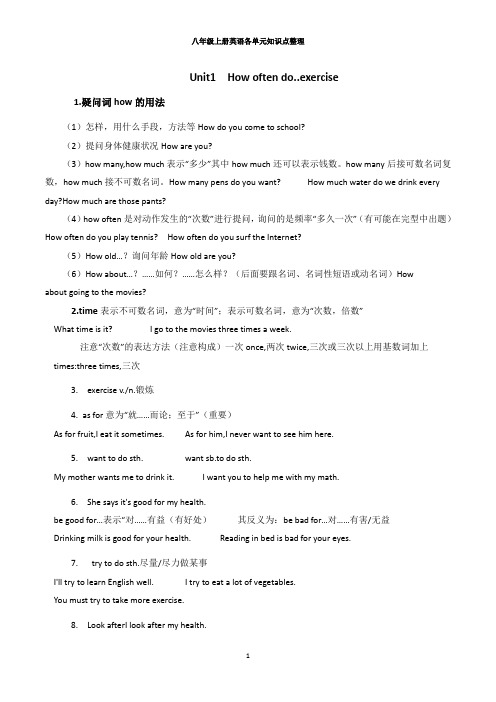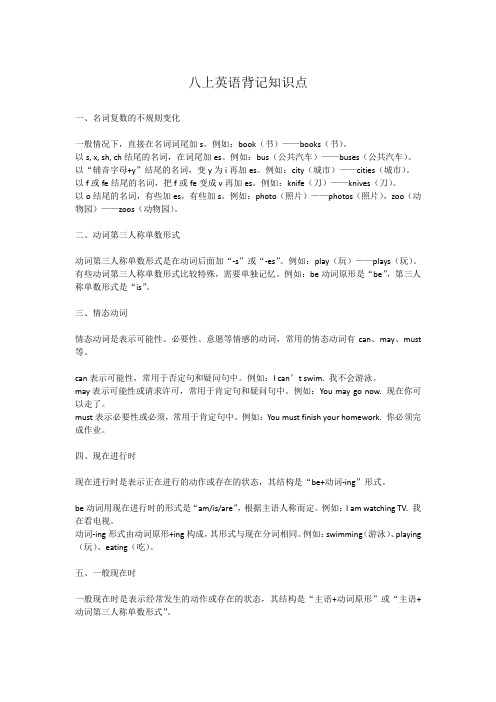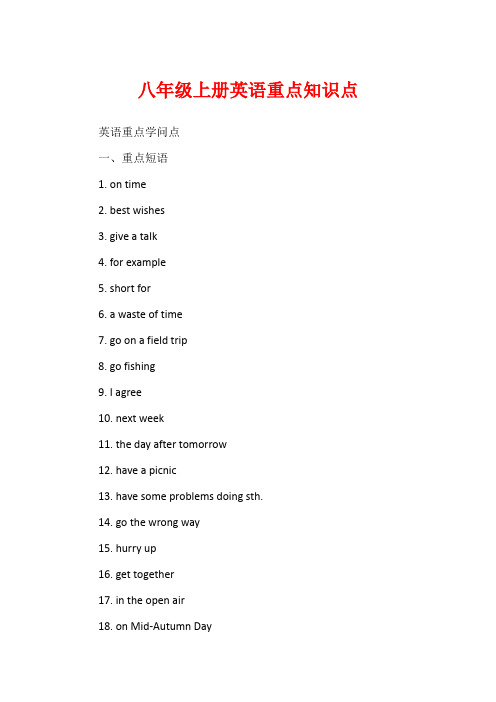八年级英语(上)全部知识点
- 格式:pdf
- 大小:1.00 MB
- 文档页数:6

人教版八年级上册英语语法、短语和知识点总结归纳一、语法1. 一般现在时- 用法:表示经常性或惯性的动作或状态。
- 结构:主语 + 动词原形 (+ 其他成分)- 示例:I play soccer every weekend.2. 一般过去时- 用法:表示过去某个时间点或一段时间内发生的动作或存在的状态。
- 结构:主语 + 动词过去式 (+ 其他成分)- 示例:She watched a movie last night.3. 现在进行时- 用法:表示现在正在发生的动作。
- 结构:主语 + am/is/are + 动词-ing (+ 其他成分)- 示例:They are studying for the exam.4. 现在完成时- 用法:表示动作或状态发生在过去某个时间点,但与现在有关。
- 结构:主语 + have/has + 动词过去分词 (+ 其他成分)- 示例:I have finished my homework.5. 情态动词- 用法:表示能力、意愿、可能性等。
- 常见的情态动词有 can, could, may, might, must, should, ought to 等。
- 示例:He should go to bed early.二、短语1. as well as- 用法:表示两个事物同时存在或发生。
- 示例:She can speak English as well as Chinese.2. in order to- 用法:为了做某事。
- 示例:They woke up early in order to catch the train.3. by the way- 用法:用于引入一个新的话题或问题。
- 示例:By the way, have you seen the latest movie?三、知识点1. 直接引语和间接引语- 直接引语:用引号括起来的原话。
- 间接引语:将直接引语转述为陈述句或疑问句。

Unit1 How often do..exercise1.疑问词how的用法(1)怎样,用什么手段,方法等How do you come to school?(2)提问身体健康状况How are you?(3)how many,how much表示“多少”其中how much还可以表示钱数。
how many后接可数名词复数,how much接不可数名词。
How many pens do you want? How much water do we drink every day? H ow much are those pants?(4)how often是对动作发生的“次数”进行提问,询问的是频率“多久一次”(有可能在完型中出题)How often do you play tennis? How often do you surf the Internet?(5)How old…?询问年龄How old are you?(6)How about…?……如何?……怎么样?(后面要跟名词、名词性短语或动名词)Howabout going to the movies?2.time表示不可数名词,意为“时间”;表示可数名词,意为“次数,倍数”What time is it? I go to the movies three times a week.注意“次数”的表达方法(注意构成)一次once,两次twice,三次或三次以上用基数词加上times:three times,三次3. exercise v./n.锻炼4. as for意为“就……而论;至于”(重要)As for fruit,I eat it sometimes. As for him,I never want to see him here.5. want to do sth. want sb.to do sth.My mother wants me to drink it. I want you to help me with my math.6. She says it's good for my health.be good for…表示“对……有益(有好处)其反义为:be bad for…对……有害/无益Drinking milk is good for your health. Reading in bed is bad for your eyes.7. try to do sth.尽量/尽力做某事I'll try to learn English well. I try to eat a lot of vegetables.You must try to take more exercise.8. Look afterI look after my health.My brother is ill. I have to look after him today.He often helps his mother look after his little sister.9. help sb.(to)do sth.帮助某人做某事(to大多都是省略)My healthy lifestyle helps me get good grades. She often helps me learn math.10. the same as…与……一样Is her lifestyle the same as yours or different?She looks the same as her sister.11. I think I'm kind of unhealthy.kind of=a little有点儿(重要短语);a kind of一种12. although=thoughAlthough he's ill,he goes to school on time.13. keep in good health(重点掌握)=keep healthy=stay healthykeep+形容词表示保持某种状态A lot of vegetables help you to keep in good health.Keep quiet!The baby is sleeping. We must keep our classroom clean14. That sounds interesting.look(看起来),sound(听起来),smell(闻起来),taste(尝起来),feel(觉得),seem(好象),grow(变得),get(变得)等词在英语中可用作系动词,后跟形容词作表语。

八上英语背记知识点一、名词复数的不规则变化一般情况下,直接在名词词尾加s。
例如:book(书)——books(书)。
以s, x, sh, ch结尾的名词,在词尾加es。
例如:bus(公共汽车)——buses(公共汽车)。
以“辅音字母+y”结尾的名词,变y为i再加es。
例如:city(城市)——cities(城市)。
以f或fe结尾的名词,把f或fe变成v再加es。
例如:knife(刀)——knives(刀)。
以o结尾的名词,有些加es,有些加s。
例如:photo(照片)——photos(照片),zoo(动物园)——zoos(动物园)。
二、动词第三人称单数形式动词第三人称单数形式是在动词后面加“-s”或“-es”。
例如:play(玩)——plays(玩)。
有些动词第三人称单数形式比较特殊,需要单独记忆。
例如:be动词原形是“be”,第三人称单数形式是“is”。
三、情态动词情态动词是表示可能性、必要性、意愿等情感的动词,常用的情态动词有can、may、must 等。
can表示可能性,常用于否定句和疑问句中。
例如:I can’t swim. 我不会游泳。
may表示可能性或请求许可,常用于肯定句和疑问句中。
例如:You may go now. 现在你可以走了。
must表示必要性或必须,常用于肯定句中。
例如:You must finish your homework. 你必须完成作业。
四、现在进行时现在进行时是表示正在进行的动作或存在的状态,其结构是“be+动词-ing”形式。
be动词用现在进行时的形式是“am/is/are”,根据主语人称而定。
例如:I am watching TV. 我在看电视。
动词-ing形式由动词原形+ing构成,其形式与现在分词相同。
例如:swimming(游泳)、playing (玩)、eating(吃)。
五、一般现在时一般现在时是表示经常发生的动作或存在的状态,其结构是“主语+动词原形”或“主语+动词第三人称单数形式”。

八年级上册英语知识点复习过去学习的英语知识点能得到很多新的收获。
这是店铺整理的八年级上册英语知识点,希望你能从中得到感悟!八年级上册英语知识点(一)I’m more outgoing than my sister.【复习目标】● 谈论个性特征● 学会使用形容词的比较级比较人的个性特征● 学会比较身边的事物并选择最佳方案【语言目标】● Is that Sam? No, that’s Tom,He has shorter hair than Sam. He’s calmer than Sam.【语言结构】● 比较级-er, -ier, more的使用● both的用法【重点词汇】● more, than,/ more athletic, more popular,/ twin, both, be good at● taller, shorter, thinner, longer, heavier ,calmer, wilder, quieter, funnier,smarter【应掌握的词组】1. long hair 长头发2. How are you? 你身体好吗?3. How old 多大年纪4. how tall 多高5. how long ago多久前(的事)6.more outgoing 比较外向7. want/plan to do sth. 意欲,企图8. here are photos of me 这是我的照片9. as you can see 正如你所看到的10. in some ways在某些地方11. we look the same我们看起来一样, They look different他们看起来不同12. the same to ……多……是一样的13. quite the same 完全一样14. all the same 还是,同样应……15. look like 看起来像….一样,而look the same看起来很像16. go to lots of parties经常参加聚会=often go to the party17. a little taller 高一点18. take sth. from sth. 从某处拿/取出某物19. put sth. in sth. 将某物放入某物中20. make a list of 列出清单21. has cool clothes 有漂亮的衣服22. is popular in school 在学校受欢迎23. is good at sports 擅长体育24. make me laugh 使我发笑25. that’s not very important for me 那对我来说并不重要( be important for sb.)26. put up举起,抬起,挂起,张贴,建造;put on穿上,戴上,上演(戏剧);put down=write down=copy down 写下来; put out 伸出,扑灭;put away 收起来,收好;put off推迟;put one’s heart into…全神贯注于……,全身心投入……27. opposite views 相反的观点28. a weekendteacher 周末教师29. Abacus Study Center 珠算研究中心30. elementary school students 小学生31. be good with children 善于与孩子相处32. have good grades 成绩出色33. enjoy telling jokes 喜欢讲笑话34. can’t stop talking 不能停止讲话35. help others 帮助别人,help each other互相帮助36. in one’s free time在业余时间37. one of +复数名词(代词)……其中之一38. use sth. to do sth.=do sth.. with sth. 使用…做…39. be/feel sorry for sb. 为某事感到同情或难受;be / feel sorry for sth. 因某事感到抱歉或后悔;be sorry +to see/hear 听到或看到某种情况很不安或难过;say sorry to sb.向某人道歉40. begin with 从……开始41. next to 在……旁边,紧靠……42. be famous for 因… 而著名,因……而广为人知; be famous as 作为……而知名43. all together 总计,总共44. make sb. do sth. 让/使某人做某事,相似的用法有几个感官动词see, let, hear, watch, feel等【应该掌握的句子】1.What are you doing for vacation? I’m babysitting my sister.假期你要做什么?我要照顾我的妹妹。

八年级上册英语知识点必背在学习英语过程中,掌握一些基础知识点是非常重要的,这些知识点可以帮助我们更好地理解语法及词义。
今天,我们将会讲解八年级上册英语必须背诵的知识点。
一、动词时态1. 一般现在时常用于描述经常性、习惯性的行为或者客观的事实。
基本结构为主语+动词原形。
例如:I usually get up at six o'clock in the morning.2. 现在进行时表示现在正在进行或发生的动作,基本结构为主语+be动词+现在分词。
例如:She is talking on the phone right now.3. 一般过去时用来表示在过去某个时间发生过的动作,基本结构为主语+动词过去式。
例如:I went to the cinema last night.4. 过去进行时表示过去某个时间正在进行的动作,基本结构为主语+was/were+现在分词。
例如:She was listening to music when I arrived.5. 现在完成时表示已经完成的动作或发生的事件,基本结构为主语+have/has+动词过去分词。
例如:I have finished my homework already.6. 过去完成时表示过去某时完成的动作,基本结构为主语+had+动词过去分词。
例如:I had already eaten breakfast when he arrived.7. 将来时表示将来要发生的动作或状态,基本结构为主语+will+动词原形。
例如:We will go to the beach tomorrow.二、形容词和副词1. 形容词的比较级和最高级比较级表示两个事物之间的比较,最高级表示三个或以上的事物之间的比较。
基本结构为:比较级:主语+be+形容词比较级+than+被比较的对象;例如:My sister is taller than me.最高级:主语+be+the+形容词最高级+in/of+被比较的对象;例如:Lily is the tallest girl in the class.2. 副词的比较级和最高级和形容词一样,副词也有比较级和最高级。

八年级上册英语必考点
以下是八年级上册英语必考点:
1.时态:包括一般现在时、一般过去时、一般将来时以及现在进
行时等。
2.数词:包括基数词和序数词的用法。
3.代词:包括人称代词、物主代词、反身代词和指示代词的用法。
4.名词:包括可数名词和不可数名词的用法,以及单数形式和复
数形式的转换。
5.动词:包括及物动词和不及物动词的用法,以及动词的时态和
语态的转换。
6.形容词和副词:包括形容词和副词的比较级和最高级的用法。
7.冠词:包括定冠词和不定冠词的用法。
8.介词:包括表示时间、地点、方向和方式等的常用介词的用法。
9.疑问句和陈述句的转换:包括疑问词的使用和疑问句的构成。
10.宾语从句和定语从句:包括宾语从句和定语从句的引导词和构成。
11.情态动词:包括can、could、may、might、must、shall、should、will、would、have to和need的用法。
12.倒装句:包括将助动词、情态动词或系动词放在主语之前的构成和使用。
13.同义词和反义词:包括常见的同义词和反义词的词汇搭配和用法。
以上是八年级上册英语必考点的一些内容,具体还需根据教材内容和学校要求进行复习。

八年级上册英语重点笔记(精)- Unit 1: Greetings and Introductions- Basic greetings and responses- Introducing oneself and others- Asking and answering about personal information- Unit 2: Classroom Language- Vocabulary related to classroom objects- Expressions for asking and answering questions in class- Unit 3: Numbers and Time- Cardinal and ordinal numbers- Telling time and expressing schedules- Days of the week, months, and dates- Unit 4: My Family- Vocabulary for family members and extended family - Describing family members and their relationships- Talking about family activities and celebrations- Unit 5: School Life- Vocabulary related to school subjects and activities- Expressing likes, dislikes, and preferences in school- Talking about school rules and responsibilities- Unit 6: Daily Routine- Describing daily activities and routines- Time expressions for daily routines- Talking about personal habits and preferences- Unit 7: Food and Drinks- Vocabulary for food and drinks- Ordering food and drinks in a restaurant- Talking about preferences and dietary habits- Unit 8: Hobbies and Interests- Expressing likes, dislikes, and preferences in leisure activities - Talking about favorite hobbies and pastimes以上为八年级上册英语的重点笔记。

初二年级(上)【知识梳理】I. 重点短语1. on time2. best wishes3. give a talk4. for example5. short for6. a waste of time7. go on a field trip8. go fishing9. I agree10. next week11. the day after tomorrow12. have a picnic13. have some problems doing sth.14. go the wrong way15. hurry up16. get together17. in the open air18. on Mid-Autumn Day19. come over20. have to21. get home22. agree with23. in the country24. in town25. all the same26. in front of27. on the left/right side28. next to29. up and down30. keep healthy31. grow up32. at the same time33. the day before yesterday35. last Saturday36. half an hour ago37. a moment ago38. just now39. by the way40. all the time41. at firstII. 重要句型1. have fun doing sth.2. Why don’t you…?3. We’re going to do sth.4. start with sth.5. Why not…?6. Are you going to…?7. be friendly to sb.8. You’d better do sth.9. ask sb. for sth.10. say goodbye to sb.11. Good luck(with sb)!III. 交际用语1.Welcome backto school!2.Excuse me. I’m sorry I’m late, because the traffic is bad.3.It doesn’t matter.4.Happy Teachers’ Day !5.That’s a good idea.6.What are you going to do?7.Where are we going ?8.What are we going to do ?9.I’m good at…10.It’s not far from…11. Are you free tomorrow evening?12.Would you and Lily like to come over to my home for Mid-Autumn Festival?13.I’m glad you can come.14.Thanks for asking us.15.How about another one?16.May I have a taste?17.Let me walk with you.18.What do you have to do?19.Do you live on a farm?20.Which do you like better, the city or the country?21.Which do you like best, dogs, cats or chickens?22.Shall we go at ten? Good idea!23.---Let’s make it half past one. ---OK.24.---Why not come a little earlier? ---All right.25.Excuse me. Where’s the nearest post office, please?26.It’s over there on the right.27.I’m sorry I don’t know.28.You’d better…29.Thank you all the same.30.Which bus do I take?31.Go along this road.32.What day was it yesterday?33.I’m sorry to hear that.34.I hope you’re better now.35.Why did you call me?36.I called to tell…IV. 重要语法1.be going to的用法;2.形容词的比较级、最高级;3.形容词和副词的比较4.一般过去时【名师讲解】1. on the street / in the street表示“在街上”时,on the street和in the street 都可以,在美国多用on the street, 在英国多用in the street. 例如:We have a house in the street. 我们在街上有座房子。

八年级上册英语知识点总结归纳一、基本语法知识1. 时态:一般现在时、一般过去时、现在进行时、过去进行时、一般将来时、过去将来时等。
2. 动词的用法:及物动词和不及物动词的区别,动词的时态和人称变化。
3. 名词的用法:可数名词和不可数名词的区别,名词的复数形式。
4. 形容词和副词的用法:形容词和副词的比较级和最高级形式。
5. 代词的用法:人称代词、物主代词、指示代词等。
6. 介词的用法:介词短语的构成和用法。
7. 定冠词和不定冠词的用法:a, an, the的区别和用法。
二、词汇知识1. 常见的动词、名词、形容词和副词的用法。
2. 数词:基数词和序数词的用法。
3. 介词短语中常见的介词和短语的用法。
4. 连词:and, but, or等的用法。
5. 感叹词:how, what等的用法。
三、句型知识1. 肯定句、否定句和疑问句的基本用法。
2. There be 句型的用法。
3. 情态动词的用法:can, could, may, might, must等。
4. 复合句的构成和用法。
5. 定语从句的引导词和用法。
四、交际用语1. 问候和介绍自己。
2. 提出请求和建议。
3. 表示喜欢和不喜欢。
4. 打电话和约会。
五、阅读技巧1. 掌握不同类型文章的阅读技巧,如记叙文、说明文、议论文等。
2. 学会根据上下文推测词义。
3. 注意文章中的重点句子和关键信息。
六、写作技巧1. 学会使用适当的时态和语法结构。
2. 注意语言表达的准确性。
3. 练习写日记、信件、短文等不同类型的作文。

(简化版)人教版新目标八年级上册英语知识点全册人教版新目标八年级上册英语知识点全册(简化版)单元一:School life- 介绍学校的科目、教室和其他相关信息。
- 研究表达时间和日常活动。
- 研究如何询问和回答有关日常活动和时间的问题。
单元二:Hobbies- 研究谈论个人的爱好和兴趣。
- 研究使用动词的-ing形式。
- 研究询问和回答有关爱好的问题。
单元三:At the weekend- 研究谈论周末的活动和计划。
- 研究使用情态动词can和could表达能力和请求。
- 研究询问和回答有关周末计划的问题。
单元四:My town- 研究描述自己所在的城镇或城市。
- 研究使用介词in, on, at描述地点。
- 研究询问和回答有关地点的问题。
单元五:Health and fitness- 研究谈论健康和健身。
- 研究使用情态动词should表达建议。
- 研究询问和回答有关健康和健身的问题。
单元六:Festivals- 研究谈论各种节日和庆祝活动。
- 研究使用一般现在时描述节日活动。
- 研究询问和回答有关节日和庆祝活动的问题。
单元七:Clothes- 研究谈论衣服和购物。
- 研究使用形容词描述衣服。
- 研究询问和回答有关衣服和购物的问题。
单元八:Inventors and inventions- 研究谈论发明家和发明物。
- 研究使用被动语态描述发明物。
- 研究询问和回答有关发明家和发明物的问题。
单元九:Heroes- 研究谈论英雄和英雄的品质。
- 研究使用情态动词may和might表达推测。
- 研究询问和回答有关英雄的问题。
单元十:Customs and traditions- 研究谈论各种俗和传统。
- 研究使用一般过去时描述过去的俗。
- 研究询问和回答有关俗和传统的问题。
单元十一:World records- 研究谈论世界纪录和成就。
- 研究使用比较级和最高级形容词来描述事物。
- 研究询问和回答有关世界纪录和成就的问题。

八年级上册英语重点知识点英语重点学问点一、重点短语1. on time2. best wishes3. give a talk4. for example5. short for6. a waste of time7. go on a field trip8. go fishing9. I agree10. next week11. the day after tomorrow12. have a picnic13. have some problems doing sth.14. go the wrong way15. hurry up16. get together17. in the open air18. on Mid-Autumn Day19. come over20. have to21. get home22. agree with23. in the country24. in town25. all the same26. in front of27. on the left/right side28. next to29. up and down30. keep healthy31. grow up32. at the same time33. the day before yesterday35. last Saturday36. half an hour ago37. a moment ago38. just now39. by the way40. all the time41. at first二. 重要句型1. have fun doing sth.2. Why dont you?3. Were going to do sth.4. start with sth.5. Why not?6. Are you going to?7. be friendly to sb.8. Youd better do sth.9. ask sb. for sth.10. say goodbye to sb.11. Good luck(with sb)!三. 交际用语1.Welcome backto school!2.Excuse me. Im sorry Im late, because the traffic is bad.3.It doesnt matter.4.Happy Teachers Day !5.Thats a good idea.6.What are you going to do?7.Where are we going ?8.What are we going to do ?9.Im good at10.Its not far from11. Are you free tomorrow evening?12.Would you and Lily like to come over to my home for Mid-Autumn Festival?13.Im glad you can come.14.Thanks for asking us.15.How about another one?16.May I have a taste?17.Let me walk with you.18.What do you have to do?19.Do you live on a farm?20.Which do you like better, the city or the country?21.Which do you like best, dogs, cats or chickens?22.Shall we go at ten? Good idea!23.---Lets make it half past one. ---OK.24.---Why not come a little earlier? ---All right.25.Excuse me. Wheres the nearest post office, please?26.Its over there on the right.27.Im sorry I dont know.28.Youd better29.Thank you all the same.30.Which bus do I take?31.Go along this road.32.What day was it yesterday?33.Im sorry to hear that.34.I hope youre better now.35.Why did you call me?36.I called to tell四. 重要语法1.be going to的用法;2.形容词的比拟级、最高级;3.形容词和副词的比拟4.一般过去时五.重要学问点讲解1. on the street / in the street表示在街上时,on the street 和in the street 都可以,在美国多用on the street, 在英国多用in the street. 例如:We have a house in the street. 我们在街上有座房子。

八年级上册英语重点语法归纳一、一般过去时。
1. 概念:表示过去某个时间发生的动作或存在的状态。
2. 标志词:yesterday(昨天), last week(上周), last month(上个月), last year(去年), two days ago(两天前), in 1990(在 1990 年)等。
3. 构成:- 主语 + was / were + 其他(主语是第一人称 I 和第三人称单数用 was,其他人称用 were)- 主语 + 动词的过去式 + 其他。
4. 动词过去式的构成规则:- 一般在动词末尾加 -ed,如:play - played。
- 结尾是 e 的动词加 -d,如:like - liked。
- 重读闭音节词,双写末尾辅音字母再加 -ed,如:stop - stopped。
- 以辅音字母 + y 结尾的动词,变 y 为 i 再加 -ed,如:study - studied。
二、频度副词。
1. 常见的频度副词有:always(总是), usually(通常), often(经常), sometimes(有时), seldom(很少), never(从不)2. 频度副词在句中的位置:通常放在实义动词之前,be 动词、助动词或情态动词之后。
三、形容词和副词的比较级和最高级。
1. 比较级的构成规则:- 一般在词尾加 -er。
- 以不发音的 e 结尾的词加 -r。
- 重读闭音节词,双写末尾辅音字母再加 -er。
- 以“辅音字母 + y”结尾的词,变 y 为 i 再加 -er。
- 多音节词和部分双音节词在前面加 more。
2. 最高级的构成规则:- 一般在词尾加 -est。
- 以不发音的 e 结尾的词加 -st。
- 重读闭音节词,双写末尾辅音字母再加 -est。
- 以“辅音字母 + y”结尾的词,变 y 为 i 再加 -est。
- 多音节词和部分双音节词在前面加 most。
3. 比较级和最高级的用法:- 比较级用于两者之间的比较,常用 than 连接。

八年级上册英语全部知识点八年级英语是一个重要的阶段,这个阶段主要通过学习英语语法,掌握基础词汇和语言技能,提高对英语的理解能力和运用能力。
下面是八年级上册英语全部的知识点:语法1. 现在进行时:be+现在分词- 表示现在正在发生的动作- 常用时间状语:now, at the moment等2. 过去时:动词过去式- 表示过去发生的动作- 常用时间状语:yesterday, last week等3. 一般将来时:will+动词原形- 表示将要发生的动作- 常用时间状语:tomorrow, in the future等4. 情态动词- can/could, may/might, will/would, shall/should, must等- 表示能力、推测、意愿、命令、必须等情态5. 被动语态- be+过去分词- 表示动作的承受者是主语,强调动作的结果而非动作的执行者6. 宾语从句- 引导词包括that, if, whether, how等- 在句中作宾语7. 定语从句- 引导词包括that, which, whose, who等- 在句中修饰名词或代词词汇1. 常用动词- be, have, do, go, take, make, come等2. 易混淆词汇- good/well, bad/badly, usually/often等- 意义相近的单词3. 常用名词- person, place, thing, time等4. 常用形容词- big, small, tall, short, interesting, boring等5. 常用副词- slowly, fast, loudly, softly, well等语言技能1. 听力- 听懂基础日常英语对话和简单文章- 通过听写、跟读等训练来提高听力水平2. 口语- 练习日常英语对话,提高口语表达能力- 练习独白和演讲,提高流利度和语感3. 阅读- 阅读简单的英语文章,掌握基础单词和表达方式- 阅读英文小说和资料,提高阅读理解能力4. 写作- 练习书写英文单词和句子,提高写作质量- 练习写作各类文章,如日记、信件、作文等以上就是八年级上册英语全部知识点。

英语八年级上各单元知识点第一单元:School Life1. 询问和回答日程安排e.g. What’s your schedule for tomorrow?I have English class in the morning and then Math class in the afternoon.2. 表示喜欢和不喜欢的动词及常用短语e.g. like, love, enjoy, hate, can’t stand, be fond of, be crazy about3.校园生活用语e.g. school bag, school uniform, homework, calculator, student ID card, bulletin board, classroom, school cafeteria第二单元:Greetings1. 问候,并做回应e.g. Hello!/Hi!/Good morning!/Good afternoon! Hello!/Hi!/Good morning!/Good afternoon!2. 自我介绍e.g. My name is…I am in the eighth grade.I am from…3. 礼貌用语e.g. Excuse me.Sorry.Thank you.You’re welcome.第三单元:Describing People1. 形容词的基本用法e.g. tall, short, thin, fat, pretty, handsome, ugly2.资料解释常用短语e.g. be medium height, have curly hair, wear glasses, have a beard, have a mustache3.性格描写常用短语e.g. be friendly, be hardworking, be quiet, be outgoing, be honest, be polite第四单元:My Family1. 询问家庭成员及作出回答e.g. How many people are there in your family?There are four people in my family.2. 介绍家人e.g. This is my mother/father/brother/sister.3. 与家庭相关的用语e.g. family photo, family tree, family reunion, family tradition 第五单元:Hobbies1. 表达特殊的爱好和经常做的事情e.g. I like swimming, but I’m really into chess.I often play basketball on weekends.2. 询问兴趣爱好e.g. What do you like doing in your spare time?I like playing the guitar.3. 常见爱好的表达e.g. playing sports, reading books, watching TV, playing a musical instrument第六单元:Food and Drinks1. 订单时用语e.g. What would you like to eat/drink?I’d like some pizza and a glass of orange juice.2. 表示喜好和不喜好的用语e.g. like, love, hate, can’t stand, enjoy, prefer3. 常见食物和饮品的表达e.g. burgers, noodles, salad, milk, water, coffee, tea 第七单元:Travel1. 书写、演示和询问旅行计划e.g. Do you have any plans for the summer vacation? I’m going to visit my grandparents in the countryside.2. 询问交通工具e.g. How are you going there?I’m going there by car.3. 常用旅游用语e.g. travel agency, tourist attraction, sightseeing, map 第八单元:Weather1. 询问天气e.g. What’s the weather like today?It’s sunny/cloudy/rainy/windy.2. 天气相关短语e.g. raining cats and dogs, the four seasons, climate, temperature3. 给出和叙述天气预报e.g. It will be sunny tomorrow with a high of 28 degrees Celsius.。

八年级上学期英语知识点八年级英语短语总汇Unit1 Topic11.be going to do 打算做某事2.See sb do sth看见某人做某事(全过程)See sb doing sth看见某人正在做某事(正在进行)3.cheer sb on为...加油4.Play against=fight against 与...对抗/大战5.Be against--Be for 反对—赞同6.practice+doing 练习做...7.Prefer+doing 跟喜欢...Prefer doing to doing 或比起做后者,更喜欢做前者Perfer to do, quite a lot/bit/often.Which one do you prefer, which kind of that?10. Join+某人/组织Join in+活动/比赛加入Take part in+活动/比赛Be in+活动/比赛13.Know about... 知道/了解有关于...当时间来临时,我们将采取行动;这是我们的计划。
15. It takes sb+时间/钱 to do sthSpend+时间/钱+(in) doing sth 在某方面花费多少Spend+时间/钱+on+n.物+cost+时间/钱16.There be going to be=there will be 这里将会有...17.Be good at+(doing)sth=Do well in+(doing)sth 擅长做...18.Be sure that+宾语从句确信... 19.Be sure to do 肯定要做...20.Be sure of/about 对...有把握 21.At the weekend 在周末22.Make sb/sth+adj 使...处在什么状态23.Keep+adj 保持...;keep sb/sth+adj 使...保持什么状态24.A way to 一种...的方法 25.Relax oneself 使某人自己放松26.Play for 为...效力27.Arrive in=get to=reach+大地方;Arrive at+小地方28.Excited(人);exciting(物)29.Leave for动身做某地;leave A for B 离开A地去B地Unit1 Topic21.Could you(not)....=cuold/would you please(not)do=would/do youmind(not)doing=Would you mind (not)+if+从句2.fall ill=be ill 生病其中之一是n的复数形式.优化后的文本可以是:Use 'keep doing' for continuous action and 'keep on doing' for repeated action with intervals.5.Help sb.=give sb a hand 帮助某人6.V.+间宾(人)+直宾(物)=V.+直宾+to/for+间宾7.Sure=certainly=of course 当然8.Not at all=certainly not=of course not 不介意9.Never mind=it’s nothing=it’s doesn’t matter 没关系乱扔11.Adj.修饰不定代词放其后12.Be sorry for/about.... 对...感到内疚13.What do you mean by...?=what does...mean?=what’s the meaning of...?意思是什么?14.Shout at sb. 斥责某人15.Do/try one’s best to do sth 尽某人做大的努力做某事16.Be angry with sb. For doing sth 因为某人做某事而生气17.be angry at/about sth 因某事而生气18.be angry with 因...而生气19.With the help of sb.=with one’help 在某人的帮助下20.Say...to sb. 对某人说...e into being=be born 形成/产生22.So...that... 如此...以致...=to...too... 太...而不能...23.A century=one hundred year 一个世纪24.Over=more than 超过25.Through(中间)=aross(表面) 通过阻止他们从做28.It’s + adj +(for sb.)+to do (对某人来说)做...是...29.Another+基数词又一,在一; other +n.复数另外的Around=all_over 处到处31.Just for...只是为了...32.Turn...into... 使...变成...33.Sit around 围坐在34.Get from doing 得到...35.Such as 后不可列出前面所提过的所有东西36.A number of+n.可数复数许多的;the number of+n.单数 ...的数量37.Hero 复数(Pl.) heroesUnit1 Topic31.连字符后不加soman则例外,需用复数。

英语八年级上册重点知识归纳
摘要:
一、英语八年级上册的重点知识归纳
1.语法:名词、冠词、代词、数词、介词、连词、形容词、副词、动词、句子结构
2.词汇:常用词汇、核心词汇、词汇搭配
3.阅读理解:技巧与实践
4.写作:写作技巧与实践
正文:
英语八年级上册的重点知识归纳主要包括以下几个方面:
一、语法
1.名词:名词的分类、名词的数、名词的所有格
2.冠词:不定冠词、定冠词的用法
3.代词:人称代词、物主代词、指示代词、疑问代词、反身代词、相互代词的用法
4.数词:基数词、序数词的用法
5.介词:介词的分类和常用介词的用法
6.连词:并列连词、从属连词的用法
7.形容词:形容词的分类、形容词的顺序、比较级和最高级的构成和用法
8.副词:副词的分类、副词的位置、比较级和最高级的构成和用法
9.动词:动词的分类、时态、语态、情态动词的用法
10.句子结构:简单句、复合句的构成和用法
二、词汇
1.常用词汇:根据教材内容,整理出常用词汇,方便学生记忆和应用
2.核心词汇:根据课程标准和考试要求,筛选出核心词汇,要求学生熟练掌握
3.词汇搭配:整理出常用的词汇搭配,帮助学生更好地理解和使用英语
三、阅读理解
1.技巧:提供阅读理解的方法和技巧,如快速浏览、寻找关键词等
2.实践:通过阅读理解练习题,让学生在实际操作中掌握阅读理解的技巧
四、写作
1.写作技巧:教授英语写作的基本技巧,如如何开头结尾、如何组织段落、如何使用连接词等
2.实践:通过写作练习,让学生在实际操作中掌握写作技巧,提高写作水平。

新人教版|八年级上学期英语所有必考知识点大汇总,掌握住,期末考稳拿高分!1 ?【重点语法】不定代词:不指名代替任何特定名词或形容词的代词叫做不定代词。
用法注意:1. 和 +可数名/不可数名。
多用于肯定句,多用于否认句、疑问句和条件从句。
有些问句中用,不用, 问话者希望得到对方肯定答复。
2. 由, , , 与 , , 构成的复合不定代词作主语时,其谓语动词用三单。
3. 不定代词假设有定语修饰,该定语要置于其后:如:【重点短语】1. . 为某人买某物2. + . 尝起来……3. + V.(原形) 除了……之外什么都没有4. + ( ) + 看起来5. + 大地方 / + 小地方到达某地6. . 决定做某事7. . 尝试做某事 / . 尽力做某事8. . 喜欢做某事9. . 想去做某事10. . 开场做某事 .11. . 停顿做某事区分: . 停下来去做某事12. . 不喜欢做某事14. + + + 从句如此……以至于……16. . () . 告诉某人〔不要〕做某事17. . 继续做某事18. . 忘记去做某事 / 忘记做过某事【词语辨析】1. a 拍照a 名词复数“许多…〞2. + 形容词看起来…... .+ . 似乎/好似做某事 I a+ 从句似乎..…. .... 好似,似乎….. a .3. +大地点= 地点名“到达......〞+小地点〔注:假设后跟地点副词, 介词需省略,如: ; 〕4. 感觉像…. 想要做某事5. 〔想知道〕+疑问词〔, , )引导的从句。
6. +名/代从句’t a .I ’t .7. +名词足够的…...形容词/副词2 ?【重点语法】1. 频率副词: , , , ,频率副词在句中通常放在实义动词之前, 动词或助动词之后。
常用于一般现在时态中。
2.“次数〞的表达方法一次,两次,三次或三次以上:基数词+ , 如: , ,3. “多久一次〞问频率,答复常含有频率词组或短语。
常见的疑问词:1〕多久〔以后〕— ?他多久能回来?— a . 他一个月后能回来。